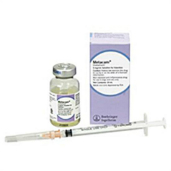Relieving pain does more than keep
your cat comfortable and happy; it can also help her heal and improve
her overall health. Research has shown that untreated pain delays
healing from injury and surgery, weakens the immune system, and has
other unwanted health effects unrelated to the disease that is causing
the discomfort.
"Do not give over the counter drugs
such as acetaminophen or ibuprofen to your cat if you think she is in
pain. They are extremely toxic to cats and can be fatal at even
very small doses."
Signs of Pain in Cats
Sometimes diagnosing pain is easy.
Cats that have been recently injured, undergone surgery or diagnosed
with a disease that is known be painful (e.g., pancreatitis) are hurting
and should be treated accordingly. However, cats are very good
at hiding their discomfort, so chronic, mild to moderate pain often
goes undiagnosed.
Signs of pain in cats can include:
- Crying out, howling or other
atypical vocalizations
- Hiding more than normal
- A loss of normal self-grooming
behavior and an unkempt appearance
- Limping
- Urinating or defecating
outside the litter box
- Restlessness
- Shying away or becoming
tense when approached or petted
- Hissing, scratching or biting
- Withdrawal from the family
or conversely, seeking more attention than normal
- Loss of appetite and/or
a reluctance to chew and swallow
- Unwillingness to move
- Reluctance to take deep
breaths
- A grimace, sometimes with
drawn back ears, dilated pupils, and a vacant look in the eyes
- A hunched back
- Licking, biting or scratching
at a particular location on the body
Veterinary Pain Relief

If you think your cat is in pain, take
her to the veterinarian. She may have an underlying condition
that needs to be diagnosed and treated, and doing so should also make
her more comfortable. Short term pain relief may be necessary
while the body heals. On the other hand, chronic conditions that
can be managed but not cured may require life-long treatment to relieve
suffering.
Nonsteroidal anti-inflammatory drugs (NSAIDs) are typically used for pain relief in dogs, but they tend to cause lots of side-effects in cats.
Metacam injections have been approved to treat short-term postoperative pain in cats, but some veterinarians still prescribe the liquid form to help manage chronic pain.
Opioids are used frequently to relieve
feline pain. Buprenorphine, which is usually given by injection,
can also be given orally. It is absorbed through the mucous membranes
of the mouth.
Drugs aren't the only treatment option,
however. Depending on your cat's condition, you might want to consider:
- Supplements like glucosamine or Duralactin
- Physical therapy
- Massage
- Acupuncture/pressure
- Cold laser therapy
Pain Management At Home
Do not give over the counter drugs
such as acetaminophen or ibuprofen to your cat if you think she is in
pain. They are extremely toxic to cats and can be fatal at even
very small doses. If your veterinarian has prescribed a pain reliever
for your cat, make sure to follow the instructions written on the label
closely. Increasing the amount you give can be dangerous.
If your cat is still suffering despite
the best efforts of your regular veterinarian, ask to be referred to
a specialist in feline pain management.
The above is provided for information purposes only and should not be used for the diagnosis or treatment of any condition.
This information does not cover all possible variables, conditions, reactions, or risks relating to any topic, medication, or product and should not
be considered complete. Certain products or medications may have risks and you should always consult your local veterinarian concerning the treatment of
your pet. Any trademarks are the property of their respective owners.